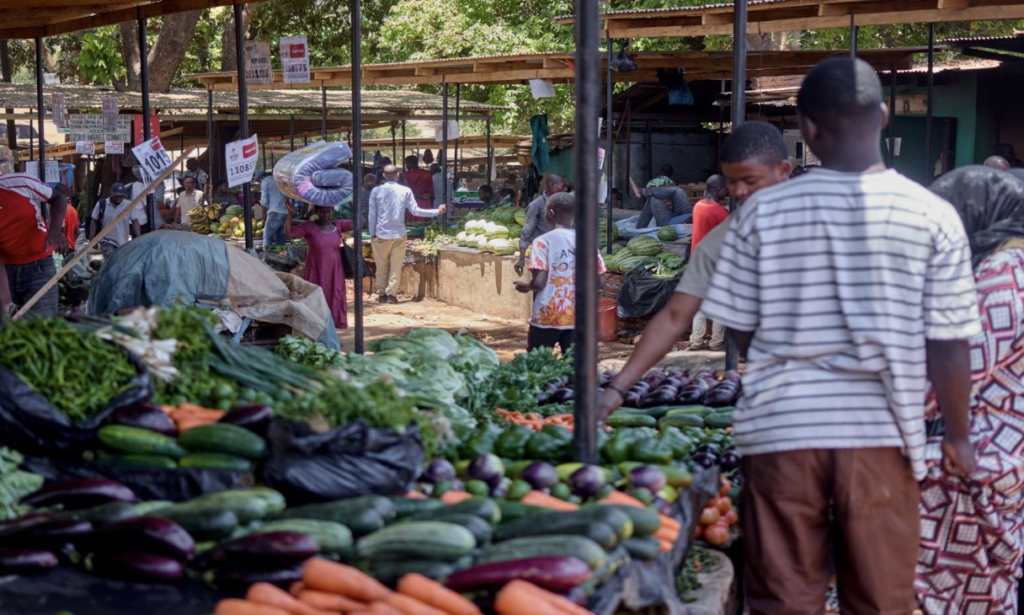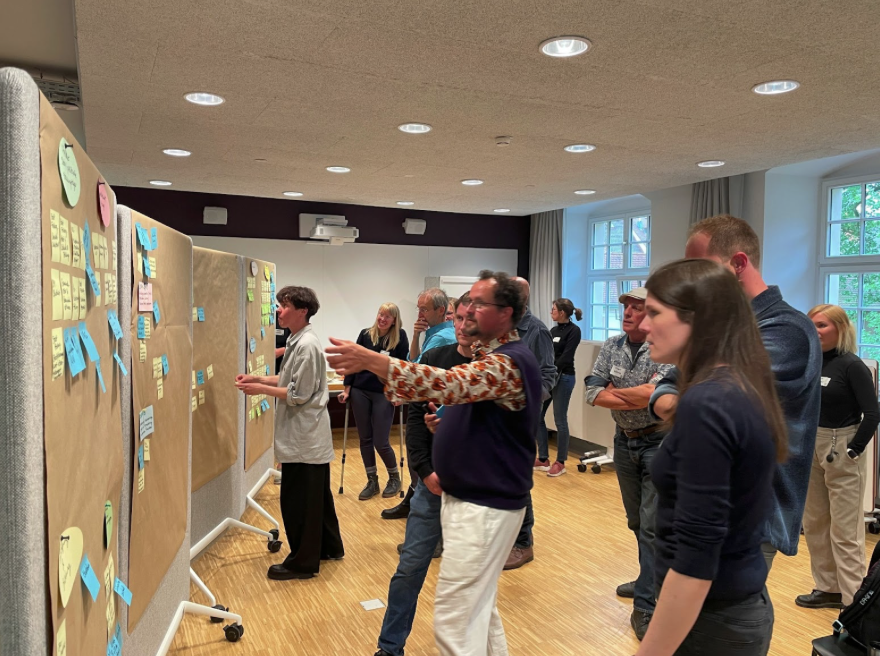If there is one aspect of a common humanity that we all share, it is that each of us has a personal and collective relationship with food, part of the web of life that sustains us. Food connects us beyond borders: Through the inputs needed to grow it, the activities and journeys that bring it from farms to markets and finally to our plates, and the many hands it passes through along the way. Yet beyond nourishing us, food also shapes the very systems that sustain our societies.
Directly linked to the livelihoods of more than 3.83 billion people in both urban and rural areas worldwide, food systems thus have a significant impact on the well-being and functioning of our society. At a time in which 2.33 billion people are experiencing moderate to severe food insecurity, and over 42% people are unable to afford a healthy diet in line with nutritional needs, the motto of World Food Day 2025, on 16 October, “Hand in Hand for Better Foods and a Better Future,” resonates more strongly than ever.
Answer the call to collaborate across governments, sectors, institutions, and communities, our global ICLEI CityFood Program and network cities are advancing actions for healthy people, landscapes, and climate. Read on for the inspiring initiatives we are bringing to the table.
In today’s context of rising food prices, corporatization of food value chains, and increasing climate risks, fresh food markets represent an important lever for local governments to make healthy food accessible to residents. They also foster social, environmental, and economic sustainability. These are all values embedded in the Strengthening local fresh food markets for healthier food environments within planetary boundaries project, developed under GIZ’s Global Program Transformation of Food Systems, which aims to turn markets into engines of urban–rural resilience. But how can cities put this into practice?
Lessons, challenges, and opportunities are well reflected in the CityFood Market Handbook for Healthy and Resilient Cities. Launched in March at the Climate Chance Europe–Africa Summit 2025 in Marseille, France, the handbook equips local governments with a practical guide to transforming food markets to enhance urban food security, nutrition, and resilient livelihoods.
At its core, the CityFood Market Action Framework outlines specific actions that local governments have taken to strengthen markets through four strategic pillars, built upon 16 global case studies from cities across Africa, Asia, Europe, and the Americas. A second edition launches at COP30 with 15 additional cases and Spanish and Portuguese translations.
In July, we took these findings to the UN Food Systems Summit +4 Stocktake (UNFSS+4), held in Addis Ababa, Ethiopia, presenting at the side event ‘Strengthening Urban-Rural Linkages through Local, Traditional and Farmers Markets’. Speakers from FAO, UN-Habitat, the World Farmers Markets Coalition, and GAIN recognized local markets as strategic entry points for systemic, locally led, and inclusive transformation of food systems across both formal and informal sectors.
The project also features the CityFood Interest Group on Transforming Food Markets. In partnership with GAIN, the Interest Group brings together cities from Africa, Europe, North America, South America, South Asia, Southeast Asia, Central America, and the Caribbean, to provide a platform to exchange experiences, discuss challenges, and collaborate on practical solutions for improving food markets.
Expert-led training sessions and workshops are covering key topics such as market governance and infrastructure, food waste, hygiene and safety, mitigating climate change risks, and market governance and infrastructure.
Notably, in our July webinar, cities exchanged on gender and social inclusion, a core lens toward fair, and people-centered local markets. And cities are already showing what this looks like.
For example, in Dhaka, Bangladesh, markets are adding breastfeeding corners. Markets in Arusha, Tanzania, and Fort Portal, Uganda, are enabling women vendors to step into leadership roles and work in safe, designated spaces, strengthening inclusive food governance. And in San Luis Potosí, Mexico, food security programs for low-income households pair food support with personalized assistance, nutrition education, and household-economy workshops.
While these efforts are linked to global advocacy and peer exchange, the project also has an on the ground implementation component linked to the revitalization of fresh food markets in Lilongwe, Malawi, and Lusaka, Zambia. After deep consultations with local partners and market actors, ICLEI Africa is now rolling out transformative upgrades in two flagship sites.
At Lilongwe’s Lizulu Horticulture Market, work on waste management, roofing, and paving is making the market safer, cleaner, and more climate-resilient. At Lusaka’s Chilenje Market, one of the oldest markets in Zambia hosting over 1000 traders, improvements to water reticulation, drainage, and waste systems will cut flooding risks and boost hygiene.
These physical upgrades are paired with trader training on food handling and safety, business skills, vendor registration and regulatory compliance. In addition, food processing, packaging and value-building have also been covered, and to unlock future financing, briefing material is being prepared.
Local Task Forces – council officials from multiple departments – have been pivotal in both cities, securing permissions, ensuring standards, identifying additional markets for investment, and validating data with on-the-ground insight of the market ecosystems.

In Tunis, Tunisia, artist Ghrab Mokhtar unveiled a vibrant mural at the National Institute of Nutrition, a demonstration of public art turned into a daily nudge toward healthier diets. This action is part of the broader AfriFOODlinks project, a multi-city initiative active since 2022 that connects 20 cities across Africa and Europe to transform urban food systems through the engagement of young people and concrete interventions. As part of the project’s Youth Ambassadors program, 20 young leaders across Africa and Europe document local realities, connect with peers, and pilot creative, city-level actions, all displayed during International Youth Day on 12 August.
To date, additional project pilots are rolling out across Hub and Sharing Cities, including the completion of cold rooms at the Odunga Fish Market in Kisumu, Nairobi; school canteens in Ouagadougou, Burkina Faso, and bread recipe reformulation processes in Tunis. In Lusaka, the City Council has formally approved a City Food Desk, Zambia’s first multi-departmental coordination mechanism at the local level, creating a central hub to align food initiatives, overcome fragmentation, and advance a shared long-term vision.
Ahead of the International Day of Awareness of Food Loss and Waste that took place on 29 September, AfriFOODlinks partners in Kenya advocated for urgent action on storage, safety, and waste reduction, taking their message to national TV and radio.
The upcoming launch of the African CityFood Centre on World Food Day further consolidates the efforts taken across AfriFOODlinks at municipal levels , bringing together five pillars of concrete actions to strengthen the role of cities in building healthier, more inclusive, and more resilient food systems across Africa and beyond.
At its heart, the EU- funded FoodCLIC project is about making sure everyone can fill their plate with nutritious, safe, affordable, and sustainable food. But in many cities, especially for people living in vulnerable and food deprived areas, this is easier said than done.
That’s why the project works across city-regions to experiment with new ways of shaping urban food systems. Using the CLIC framework as a guideline, it connects science, policy, and practice to design solutions that are inclusive, sustainable, and grounded in people’s everyday realities. In the past year, eight additional city-regions in Africa and Europe have joined the project to exchange ideas, engage in peer-to-peer learning with each other and pilot cities, and adapt approaches to their own local contexts.
Since early 2025 and with the support of ICLEI’s regional offices, cities have hosted participatory workshops to map their food systems, identify key actors, and uncover local challenges and opportunities.
In Cameroon, Ebolowa is boosting local production and self-sufficiency, mapping interdependencies and spotting quick wins across its food system. In Freiburg, Germany, a refreshed stakeholder map is paving the way for the House of Food, an envisioned hub for local food initiatives. And in Thessaloniki, Greece, a focus on sustainable nutrition and urban metabolism is identifying opportunities to connect climate and food policies.
Through these activities, city-regions are not only grounding strategies in local realities, but also learning how to strengthen connections across sectors, promote inclusivity, and harness co-benefits in their food systems.
Looking ahead, the broadening city-regions will build on these insights to develop long-term visions and pathways for change, including strengthening food policy networks that bring together governments, society, and academia. At the European level, FoodCLIC is launching an online platform to support these networks at the beginning of next week, right on time for World Food Day.

Local governments are proving that change is possible when communities, policymakers, and practitioners work hand in hand.
Nevertheless, these featured initiatives are just a glimpse of the broader work underway across our wider network of local governments and the levers at their disposal: They can promote healthy diets and food education through school meals, use food procurement to build rural-urban linkages, and foster innovations in food policy.
Across our network, cities are already experimenting with these levers — whether it’s about improving nutrition for school children through urban gardens in Indian municipalities, developing solutions for urban food waste as discussed at the Seoul International Forum on Climate and Environment, or building food and climate resilience in the context of Small Island Developing States.
Looking forward, the challenge and the opportunity are clear: To make healthy, sustainable, and equitable food accessible to all, cities must continue to collaborate, learn from one another, and place the lived experiences of their residents at the center of decision-making. Each workshop, urban garden, market upgrade, mural, or youth-led initiative is a step toward a future where everyone’s right to good food is realized.
This upcoming World Food Day, ICLEI CityFood celebrates these efforts and the global movement we are part of. Yet, we are far from the finish line. As a signatory of the Climate Champions Food Systems Call to Action, we recognize the importance of centering frontline food systems actors, moving towards a just transition and collective action.
By working hand in hand to create better foods and a better future, local governments everywhere can transform their food systems, leaving a lasting legacy of health, inclusion, and resilience for generations to come.


